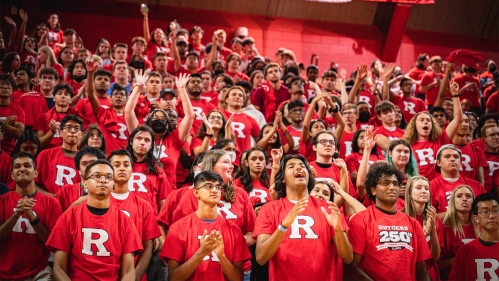
Meet Rutgers' Class of 2026: Activists and Achievers Working to Improve the World
Members of Rutgers’ Class of 2026 have already built a resume of activism, achievement and service before entering their first university classroom or laboratory.

They have lobbied for gun safety measures, created a financial literacy business aimed at Gen Zers, and produced a film about the journey of immigrants to America. They’ve organized the cleanup of Jersey Shore beaches and coached a 3-year-old with autism to say his first words.
If positive changes are going to come to society, Abdon Andahur believes, they will start with his peers.
“At the moment, our generation and the millennials are the ones who are able to make an impact on issues like these,” said the North Plainfield resident who will study music education at Rutgers’ Mason Gross School of the Arts.
It’s a theme echoed by Dylan Chong of Jersey City, who is entering the School of Environmental and Biological Sciences at Rutgers University-New Brunswick.
“There might not be another generation that can do what needs to be done,” said Chong, who says he was driven to pursue environmental studies after his mother, who lived across from the World Trade Center on 9/11, was diagnosed with cancer.
Across the university, Rutgers is welcoming about 13,500 incoming students this fall.
President Jonathan Holloway, who greeted many members of the incoming class and their families during move-in days, said he is eager to continue meeting students as they learn more about themselves and the world at Rutgers.
“I am thrilled to welcome new caring, curious and engaged Rutgers students to our campuses, which are already brimming with energy and the promise of a fully vibrant academic year,” Holloway said.
“Nothing is more exciting than to see all the new faces as 70,000 students from across the state and around the globe return to Rutgers, full of hope and ambition and happy to be rejoined with their friends and the faculty," he added.
Andahur and Chong are emblematic of the incoming class of first-year and transfer students at Rutgers-New Brunswick, according to Courtney McAnuff, vice chancellor of enrollment management at Rutgers-New Brunswick.
“This class is unprecedented in terms of size, diversity and academic quality,” McAnuff said. “We got the cream of the crop from the state and around the country.”
Rutgers University-Camden
Kayla Hatchel took a winding path to Rutgers-Camden, but each detour has brought her closer to pursuing her bachelor of science degree in health sciences, and to realizing her ultimate goal: working with special-needs children.
The Edmond, Oklahoma, native began her educational journey in her home state 11 years ago, but financial issues cut her time on campus short after one semester.
Then came a four-year stint in the Navy, where Petty Officer Second Class Hatchel served at the Point Loma Submarine Base in San Diego, which supports the Navy’s Pacific Fleet. She spent her time maintaining files, earning education credits – and learning to be adaptable.
“The military is always changing, updating, and you have to be flexible if you want to serve,” she said. Not surprisingly, the same attribute applies to interacting with children, she observed.
After her discharge and two years at San Diego City College, where she earned her associate of arts degree in December 2021, Hatchel began researching four-year colleges. Far-away Rutgers drew her attention because her fiancé, Robert (Bob) Gordon, received his bachelor’s degree in psychology from Rutgers-Camden in 2008.
He’s now a behavior analyst for Learn Behavioral, a national company offering programs for persons with autism spectrum disorder.
Another factor in her decision was the strong reputation Rutgers-Camden has for veterans’ services, Hatchel said.
“Having a veterans’ office on campus did influence my decision to come here over my other options,” she said. “Having a point of contact helps ease my mind about the application of my benefits.”
Hatchel most recently worked at a clinic serving individuals with autism, where she met a 3-year-old with a passion for trucks.
“He didn’t have a lot of language, but he understood the concept of play,” Hatchel recalled. When she modelled playing with a toy car, or cooking in a make-believe kitchen, the child watched closely, imitating Hatchel’s every move.
“Two months into working with him I realized he was beginning to verbalize what he needed,” she said. “It began with that one word: ‘want.’ And then ‘I want.’ And then we got to the point where we no longer had to guess. He got what he needed more quickly, and was happier as a result.”
Hatchel realized she was ready to go on for her bachelor’s degree, and ultimately a master’s degree in special education. “It was hard to leave him, but now I know that working with children – preferably 2- to 5-year-olds – is what I want to do,” she said.
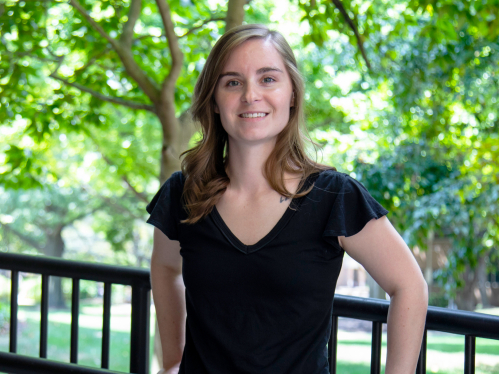
Mason Gross School of the Arts
Rutgers-New Brunswick
Abdon Andahur has been singing for as long as he can remember, and now he hopes to raise his voice to make big changes in the world.
The North Plainfield resident, who will be studying music education at the Mason Gross School of the Arts, comes to Rutgers with a history of activism that includes organizing and speaking at a Black Lives Matter rally in his hometown, which attracted 500 protesters, and collecting money for organizations such as Everytown for Gun Safety.
If reform is going to come, this teenager believes, it will start with his peers.
“At the moment, our generation and the millennials are the ones who are able to make an impact on issues like these, including LGBTQ rights,” says Andahur. “My sister Gabriela is going into high school, and for her the struggle is just beginning.”
The first-born son of immigrants from Chile says his activism comes from growing up in a community of people of color. It was nurtured by events that touched him viscerally: the death of George Floyd in 2020, the massacre of students in Uvalde, Texas, in May, and the ongoing assaults on reproductive freedom and gay rights.
“All these affect our entire generation, because we just want to live,” Andahur says.
He finds both joy and solace in the music that surrounds him.
Introduced to basic chords and instruments in elementary school, Andahur took to the lure of melodies “like a duck takes to water,” he recalls. “Music has the power to heal and to empower others who are less fortunate – to uplift and to bring awareness.”
He describes himself as a “vocalist going into classical voice.”
At Rutgers, he is eager to join one of Rutgers’ vocal ensembles, where he’ll seek out opportunities to incorporate both contemporary texts and protest music into his already robust repertoire.
Even before arriving on campus, he’s been accepted into the Rutgers University Marching Band, which tapped him to play the vibraphone in the band’s front section. The percussion instrument, similar to a steel marimba, is a favorite of jazz musicians like the late Lionel Hampton.
And of course, he’ll continue singing out where he sees injustice in any form.
“Any step we can take to make the world less violent is a step in the right direction,” Andahur says.
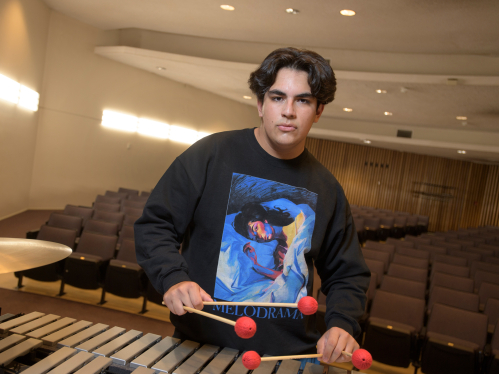
School of Environmental and Biological Sciences
Rutgers-New Brunswick
Dylan Chong’s decision to pursue environmental studies was driven by his mother’s cancer diagnosis 16 years after she was exposed to toxic particles in the air at Ground Zero following the Sept. 11 terrorist attacks.
She lived across the street from the World Trade Center on 9/11 and volunteered for weeks to bring food to front line workers. During her son’s first year of high school, she learned she had stage 4 breast and lung cancer. She received treatment through the WTC Health Program at Rutgers and qualified for the WTC Victim Compensation Fund.
“When I first found out, I was mad at everything and didn’t want to have anything to do with the environment because of what happened,” said Chong, a Jersey City resident who was in his first year of high school when his mother, then 39, with no genetic mutations, received the diagnosis in 2017.
“But understanding what happened at the World Trade Center site and what was left behind made me take a pro-active approach to the environment and provide me with a better understanding of how important it is for all of us,’’ he said.
His mother’s illness, and the time he spent with his outdoorsman father who loves to camp and fish, shaped his desire to pursue a career helping the environment.
“There might not be another generation that can do what needs to be done,” said Chong, who transferred from New Jersey City University in Jersey City to the School of Environmental and Biological Sciences at Rutgers-New Brunswick. “We have to do something now, which is why I’m excited to explore all the options I have when it comes to climate conservation.”
By the time he was in high school he realized that studying environmental conservation could be his way of helping people like this mother, who is in remission, and future generations threatened by another pressing environmental catastrophe: climate change.
He helped organize and participated in cleanups at parks in Bayonne where he went to high school and volunteered to work cleaning up some New Jersey beaches. His goal now is to do more.
“Climate change is the number one priority that we have to solve,” said Chong. “My generation must be concerned. If not, there might not be another generation to do it. I think it’s now or never.’’
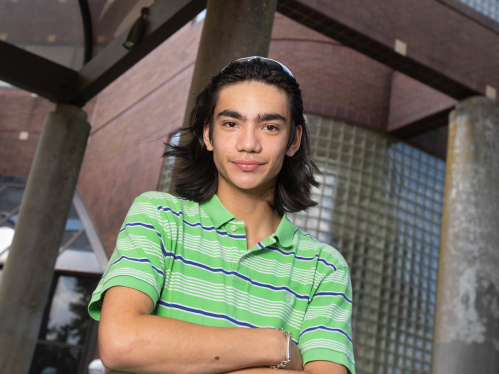



Class of 2026 by the Numbers
Scenes from move-in and convocation at Rutgers-New Brunswick
Read President Holloway's address during new student convocation at Rutgers-New Brunswick.
Rutgers-Newark
School of Arts and Sciences-Newark
Honors Living-Learning Community
Samuel Olivencia began to embrace his transgender identity at the end of high school while also starting to explore his Puerto Rican heritage. As he entered Bergen County Community College, he felt the need to connect with the identities he had spent little time being able to develop at a younger age.
“Opening myself up and starting my transition at that point in my life pushed me to want to get to know all parts of myself,” said Olivencia, who transferred to Rutgers-Newark this fall. “My father and his family were very much assimilationists when they came here from a poor section of Puerto Rico. So, I did not get to grow up with my culture a lot outside of things like food.’’
Seeing Puerto Rico’s suffering following Hurricane Maria propelled Olivencia to get involved in community issues. But he knew he needed more knowledge to tackle issues effectively.
His searching led him to the Phi Theta Kappa Honors in Action program, which encourages students to research and tackle issues in their community. He helped create a short film about immigration in America in combination with a conference with the Tenafly Korean Community Center to combat the rise in anti-Asian hate due to the pandemic. The project was internationally recognized and published in Civic Scholar: Phi Theta Kappa Journal of Undergraduate Research.
“Seeing the ways that hosting talks helped open doors to action items made me realize how much I enjoyed advocacy work,” he said.
Olivencia said he was drawn to Rutgers-Newark by the chance to continue his advocacy and activism as part of the Honors Living-Learning Community (HLLC).
“The community, the service work and the classes that come with it at the HLLC is ultimately what led me to Rutgers. I am also excited to see what it's like at a four-year institution because Rutgers is so much bigger than what I'm used to. There are so many more opportunities that are afforded to me, and I plan to take advantage to the fullest,” Olivencia said.
He said he is also excited to become part of the LGBTQ+ community on campus and has already made friends with other transgender students in the few days since he arrived at Rutgers-Newark.
“So far it has been an amazing experience and I'm looking forward to seeing what else is in store,’’ he said.
Olivencia plans to major in public and nonprofit administration after spending the summer interning at the borough clerk’s office in his hometown of Bergenfield. His end goal is to go to law school to focus on civil liberties and civil rights issues. He also wants to be part of the student government.
“I have learned that just getting my voice in the conversation can be enough to really help impact change,’’ he said. “So, imagine what voices and actions can do together.”
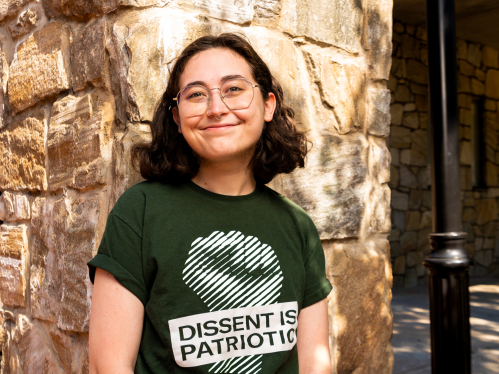
School of Engineering
Douglass Residential College
Rutgers-New Brunswick
At the start of every day in high school, Lonica Richardson would text a brief message to Hannah, the young woman she was mentoring as a member of a group called Pearls of Wisdom.
“Good morning. I hope you had a good sleep.”
“I believe in you.”
“Don’t forget to remember you are loved.”
Richardson, a resident of Grayson, Georgia, is enrolled in the School of Engineering working toward a degree in electrical and computer engineering and is part of Douglass Residential College.
She said her involvement in Pearls of Wisdom, the school-based program whose goal is to provide guidance and nurturing for young African American women, before coming to Rutgers allowed her to feel like “a light to my generation.”
“Our name came from the idea that pearls take time to ripen, and when they do, they are very beautiful,” Richardson said.
If her interaction with Hannah and other young Black students in the Pearls of Wisdom program encouraged them to discover facets of their heritage they might otherwise have missed out on, she will have done her job, she believes.
“Personally, the only people I had admired who ‘looked like me’ were my mother and maybe two other adult females,” she recalls. “I didn’t have a lot of people my age that I could relate to about living in a Caribbean-American household, or figuring out who I am culturally,” she recalled.
Music is a large part of Richardson’s life. She plays the saxophone and the drums at her church, among other activities. And while she favors jazz as a genre, she’s concentrating on worship songs for now, she says.
The Grayson High School honors grad, daughter of a tech-savvy dad, has always enjoyed tinkering with computers, using her skills to help friends and family members trouble-shoot when problems crop up.
She hopes to bring the same spirit of activism and camaraderie with her when she begins her studies on the Douglass campus.
Richardson was drawn to the spirit of inclusiveness Douglass offers, and to the fact that half of her fellow students on that campus are STEM majors. “I wanted to be part of a community of women pursuing their dreams, where we all supported each other,” she says of her decision to come north for her education.
“Pearls of Wisdom made me feel like I could change the world one step at a time,” Richardson says. “Kids are the future, and if you can build up the next generation into the best version of themselves, there is hope for that future.”
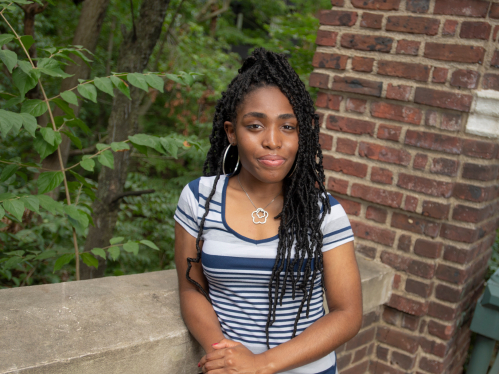
Rutgers Business School-Newark and New Brunswick
Rutgers-Newark Honors Living-Learning Community
When Adi Adara began evaluating the cost of a college degree and considering what to study, he realized there wasn’t a lot of financial information available for people his age.
It didn’t make sense to him to take on a huge financial burden without understanding what he was signing up for and without the proper tools in place to succeed. After countless hours of research, he found a great deal of information and thought others might benefit from what he learned.
That was the inspiration for starting a financial literacy business targeted toward Gen Z and sharing tips on TikTok. He soon found out he was not alone. With only 17 states requiring any level of required financial literacy for high school students, Adara discovered the gap to fill was significant – and even larger for students of color like himself. With over 700,000 followers and almost 20 million likes, Adara knew he tapped into something special.
“When you look at the numbers and see that 61 percent of Americans live paycheck to paycheck, that is a staggering statistic,’’ said the business school student and Minneapolis, Minnesota, native.
“Then when you add that there's been no increase in buying power over the past 60 years, you start to understand the magnitude of the situation we’re stepping into,’’ Adara said. “Asking us to make these massive life decisions without full context of that choice is a disservice.”
Several factors led Adara, whose legal name is Aditya Rewalliwar, to Rutgers-Newark. His mother, who is a doctor, is completing another degree in New York City and he wanted to be close to her. He was accepted into the Rutgers-Newark Honors Living-Learning Community and was also interested in the newly created Real Estate concentration at Rutgers Business School, which all made New Jersey the easy choice.
Adara has found that activism is not always easy and has learned to handle disagreement over his advice.
“When it comes down to it, spending money can often be an emotional decision. That can be stressful for a lot of people. So there is always a level of pushback,’’ Adara said.
Adara also does his best with balancing his passion and his responsibilities.
“It’s so easy to look at performance numbers on social media and fall into the trap of feeling like you aren’t doing enough or hitting your goals. Reminding myself to take breaks and spend time doing things I enjoy helps me recalibrate,” Adara said.
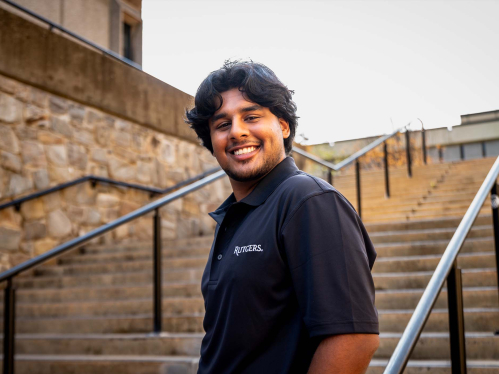



I am thrilled to welcome new caring, curious and engaged Rutgers students to our campuses, which are already brimming with energy and the promise of a fully vibrant academic year.
President Jonathan Holloway
School of Nursing-Camden
A life-threatening emergency led incoming first-year student Jenelle Eubanks to a life-affirming career decision.
During her first year at Delsea Regional High School in Franklinville, a severe allergic reaction caused Eubanks’ throat to close up and her blood pressure to drop precipitously, sending her to the nearest emergency room.
It wouldn’t be the last time.
Six months of repeated hospital visits and countless tests later, a medical team determined that the honors student had Alpha-gal syndrome, a rare tick-borne allergy most commonly seen in the South.
Eubanks, who traces the infection to an insect bite she got during a visit to Texas, emerged from the experience convinced that becoming a nurse herself would be an excellent way to give back for the medical care that saved her life countless times.
This month, the Gloucester County native starts working toward that goal at the School of Nursing-Camden. She’ll be joined by a familiar face: Her twin sister, Annalise, is also pursuing a bachelor of science degree in nursing.
Being diagnosed with Alpha-Gal has shown her how crucial it is to make personal connections with patients, as well as how dangerous it is to make snap decisions without considering the full picture.
“When I first starting having these reactions, one doctor thought I was making the symptoms up, or having a panic attack,” she says. “But if you know me, you know I’m one of the calmest people in the world. That doctor just didn’t look deep enough.”
When she finishes her degree, Eubanks hopes to travel to third-world countries as a nurse, perhaps with a nonprofit organization, and to listen intently to each patient’s story.
Eubanks developed her leadership skills in high school as vice president of her class and organizer of Operation Turkey, which she and a friend created to provide holiday baskets for homeless people.
Pre-COVID, she also volunteered at a nearby hospital, chatting with patients and helping them check in at the front desk.
Eubanks credits the nursing student who cared for the teenager while her medical team worked to determine that Eubanks is severely allergic to beef, pork and other meat products with inspiring her to pursue a career in the nursing field.
“I feel that nurses are the medical professionals who make patients feel important, who offer care that’s more on the personal side,” she says.
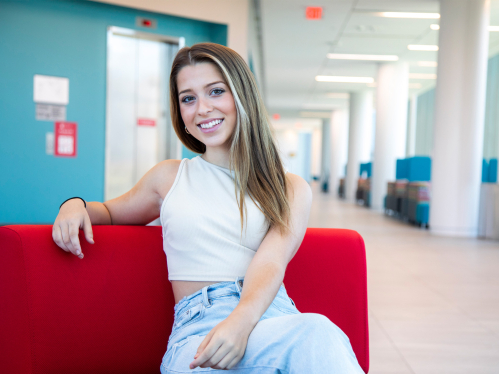
School of Arts and Sciences
Rutgers-New Brunswick
Max Martin participated in many sports growing up – soccer, basketball and martial arts among them – but his advanced skill in baseball shifted his focus exclusively to that sport before his sophomore year of high school. It’s the variety of those past athletic activities, however, that he credits with pushing him ahead on the diamond.
“Playing a lot of sports definitely helped with my overall development, both as an athlete and as a person,” said Martin, who is coming to Rutgers-New Brunswick this fall to play baseball for the Scarlet Knights. “Every year I think I’ve grown, whether physically or mentally, and that’s something that I’m very proud of.”
Martin’s reserved disposition off the field belies the accolades he achieved while competing on it, where the All-American shortstop was the nation’s 82nd-rated baseball player among the estimated 482,740 high school students participating in the sport.
“I’m a relaxed, calm-spirited person who gets along with a lot of different people and personalities,” said Martin, who lists photography and filmmaking among his academic interests. “I always try to listen and take in all the information that I can before speaking.”
Martin’s play at Moorestown High School and on the amateur circuit this past season, however, spoke loudly and earned him an invitation to Major League Baseball’s coveted June draft combine in San Diego. Scouting reports touted his balanced defensive toolset, athleticism, instincts, arm strength and compact swing among his key professional indicators.
Despite a strong performance that underscored his No. 122 overall prospect ranking from MLB.com, Martin was not selected on day one of the July draft. He chose to withdraw and reaffirm his commitment to attend Rutgers, providing the Scarlet Knights yet another victory after a season in which the program set a school-record with 44 wins under head coach Steve Owens.
“I know what I’m worth,” said Martin, who referenced the campus life, his relationship with the coaching staff and the program’s improved facilities among his reasons for choosing Rutgers. “I’m looking forward to getting started and becoming a more complete, and well-rounded, player and person.”



Article by Fredda Sacharow, Evie Duvert, Robin Lally and Kevin Lorincz
Photos by Nick Romanenko, John Munson, Ron Downes and Marques Ruiz
Published Sept. 2, 2022
For media inquiries contact Carissa Sestito at csestito@ucm.rutgers.edu or Andrea Alexander at andrea.alexander@rutgers.edu